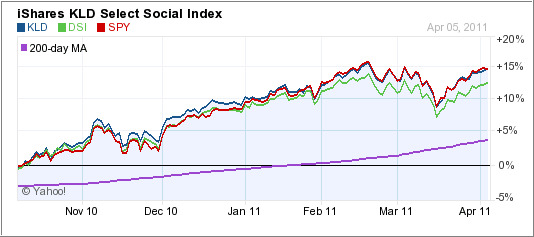Several readers have inquired about socially responsible ETFs. Here’s the latest update called “Do-Good SRI ETFs Invest With Principles:”
Now indexed exchange-traded funds also let people put their cash where their conscience is.
An increasing number of ETFs track U.S. and international indexes of companies that show commitment to environmental, social and corporate governance criteria. Others focus on alternative energy and so-called clean-tech industries, or on religious principles.
As a group, socially responsible funds still suffer from a perception among investors that they are too restrictive about the types of companies they invest in, and so are less profitable than funds without such limitations.
The roughly $100 billion invested in socially responsible investing, or SRI, funds is still tiny compared with the $7 trillion invested in all stock mutual funds and ETFs as of the end of February, according to fund researcher Strategic Insight.
“People hear ‘socially responsible’ and they think they’re investing in organic-food manufacturers and Christian book stores,” says Michael Johnston, senior analyst at ETF Database, an online guide to ETF investing. But “if you look under the hood, it’s companies that for various reasons have been deemed to be responsible from a social, environmental and governance perspective.”
In fact, a lot of socially responsible ETFs include names that might surprise you.
IShares MSCI KLD 400 Social Index (DSI 48.90, +0.07, +0.15%) , which follows the broad, socially responsible U.S. benchmark of the same name, includes many staples of the Standard & Poor’s 500-stock index (SPX 1,336, +2.91, +0.22%) . Its top five positions recently: Microsoft Corp., International Business Machines Corp., Procter & Gamble Co., Johnson & Johnson and Wells Fargo & Co.
Sibling iShares MSCI USA ESG Select Social Index (KLD 57.77, +0.00, +0.01%) counts electrical-systems leader Eaton Corp. and coffee retailer Starbucks Corp. as its two largest holdings. Dell Inc. and Nike Inc. are in its top 10.
This branching out by SRI funds is part of another trend known as sustainable investing, which bets not just on companies with, say, a morally acceptable business, but on companies that are responsive to their employees, customers and communities, which in theory generates loyalty — and more income.
“There’s an argument to be made that these companies will do quite well over the long term,” Johnston said. “They’re likely to avoid litigation, environmental disasters, bad PR.”
While it is strictly a personal decision as to whether these ETFs are right for you, I will comment only on the technical issues.
In the 6-month chart above, I am comparing two of the ETFs mentioned in the article, namely KLD and DSI vs. SPY (S&P 500). As you can see, both track the S&P 500 fairly closely.
Even though both ETFs have net assets in the $150 million range, daily volume is simply atrocious. You will not find any professionals in this arena. With 2,000 to 6,000 shares of average daily volume, these ETFs are only suited for the small investor. As a result, the bid/ask spreads are very wide and may not be acceptable to you.
Nevertheless, if your conscience is your guide when it comes to investing, you may want to do some further research subject to the caveats mentioned above.
Contact Ulli
